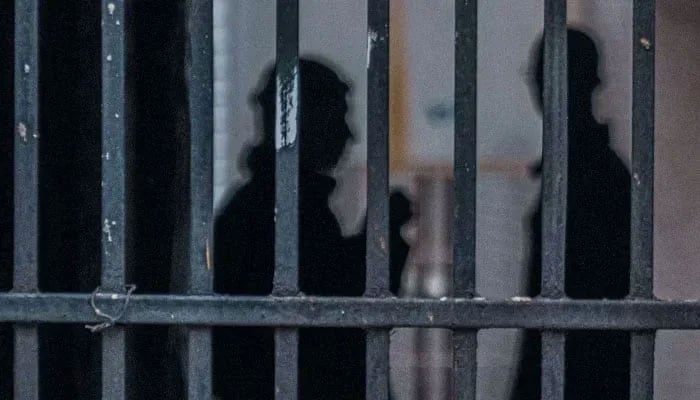Justice behind bars
Number of incarcerated women has been on steady rise since 2019, with 2.8% increase recorded between 2023 and 2024
A recent report by the Ministry of Human Rights, presented to the National Assembly, offers a sobering glimpse into the state of women incarcerated in Pakistan. With 2,084 women currently imprisoned across the country – constituting 1.37 per cent of the total prison population – on the surface, the numbers may appear modest. However, the details warrant urgent reflection and reform. The number of incarcerated women has been on a steady rise since 2019, with a 2.8 per cent increase recorded between 2023 and 2024. This trend, along with the challenges outlined by the ministry itself, makes it abundantly clear: Pakistan needs prison reform at a larger scale, focusing on the rights, conditions and treatment of women prisoners. There are only four dedicated women’s prisons in the country – three in Sindh and one in Multan – leading to most women detainees being housed in separate barracks within male prisons. This often fails to offer women the privacy, protection and dignity they deserve. Coupled with overcrowding, limited rehabilitation facilities and an underdeveloped probation system, these conditions can lead to further marginalisation and psychological trauma.
The report, titled ‘Plight of Women in Pakistan’s Prisons’, rightly identifies crucial gaps and recommends a set of reforms, including reducing the number of under-trial prisoners, developing sentencing alternatives, and improving post-release reintegration programmes. Legal reforms are essential in a justice system where procedural delays and lack of legal counsel disproportionately affect women, many of whom are incarcerated for non-violent or socio-economically driven offences, such as narcotics-related crimes. To its credit, the government has made some progress. Probation and parole services have expanded slightly, and female prisoners now reportedly have access to basic facilities like food, medical care, vocational training and legal support. However, these developments are incremental at best and not consistent across provinces. For example, while 190 women have benefited from probation in Punjab, the numbers in Sindh and KP are dismally low – only nine and six, respectively.
True prison reform must move beyond piecemeal improvements and recognise that the criminal justice system, as it stands, often fails to account for the socio-economic vulnerabilities that drive women to crime. Many incarcerated women are mothers, primary caregivers or victims of domestic violence. The establishment of the Implementation Commission on Prison Reforms, as directed by the Islamabad High Court in 2019, is a step in the right direction. But commissions and reports alone are not enough. What is needed is robust political will, resource allocation and a gender-sensitive approach to justice that prioritises rehabilitation over retribution. Women prisoners are citizens with rights, and their treatment is a direct measure of our commitment to human dignity and reform.
-
 Tucker Carlson Says Passport Seized, Staff Member Questioned At Israel Airport
Tucker Carlson Says Passport Seized, Staff Member Questioned At Israel Airport -
 Taylor Swift Made Sure Jodie Turner-Smith's Little Girl Had A Special Day On 'Opalite' Music Video Set
Taylor Swift Made Sure Jodie Turner-Smith's Little Girl Had A Special Day On 'Opalite' Music Video Set -
 Eric Dane Says Touching Goodbye To Daughters Billie And Georgia In New Netflix Documentary
Eric Dane Says Touching Goodbye To Daughters Billie And Georgia In New Netflix Documentary -
 Channing Tatum Reveals What He Told Daughter After Violent Incident At School
Channing Tatum Reveals What He Told Daughter After Violent Incident At School -
 King Charles Lands In The Line Of Fire Because Of Andrew Mountbatten-Windsor
King Charles Lands In The Line Of Fire Because Of Andrew Mountbatten-Windsor -
 Denise Richards Doubles Down On Abuse Claims Against Ex Husband Aaron Phypers Amid Show Return
Denise Richards Doubles Down On Abuse Claims Against Ex Husband Aaron Phypers Amid Show Return -
 Russia Set To Block Overseas Crypto Exchanges In Sweeping Crackdown
Russia Set To Block Overseas Crypto Exchanges In Sweeping Crackdown -
 Gwyneth Paltrow Reveals Deep Personal Connection With Kate Hudson
Gwyneth Paltrow Reveals Deep Personal Connection With Kate Hudson -
 Prince Harry, Meghan Markle’s Game Plan For Beatrice, Eugenie: ‘Extra Popcorn For This Disaster’
Prince Harry, Meghan Markle’s Game Plan For Beatrice, Eugenie: ‘Extra Popcorn For This Disaster’ -
 OpenAI To Rollout AI Powered Smart Speakers By 2027
OpenAI To Rollout AI Powered Smart Speakers By 2027 -
 Is Dakota Johnsons Dating Younger Pop Star After Breakup With Coldplay Frontman Chris Martin?
Is Dakota Johnsons Dating Younger Pop Star After Breakup With Coldplay Frontman Chris Martin? -
 Hilary Duff Tears Up Talking About Estranged Sister Haylie Duff
Hilary Duff Tears Up Talking About Estranged Sister Haylie Duff -
 US Supreme Court Strikes Down Trump’s Global Tariffs As 'unlawful'
US Supreme Court Strikes Down Trump’s Global Tariffs As 'unlawful' -
 Kelly Clarkson Explains Decision To Quit 'The Kelly Clarkson Show'
Kelly Clarkson Explains Decision To Quit 'The Kelly Clarkson Show' -
 Inside Hilary Duff's Supportive Marriage With Husband Matthew Koma Amid New Album Release
Inside Hilary Duff's Supportive Marriage With Husband Matthew Koma Amid New Album Release -
 Daniel Radcliffe Admits To Being Self Conscious While Filming 'Harry Potter' In Late Teens
Daniel Radcliffe Admits To Being Self Conscious While Filming 'Harry Potter' In Late Teens




